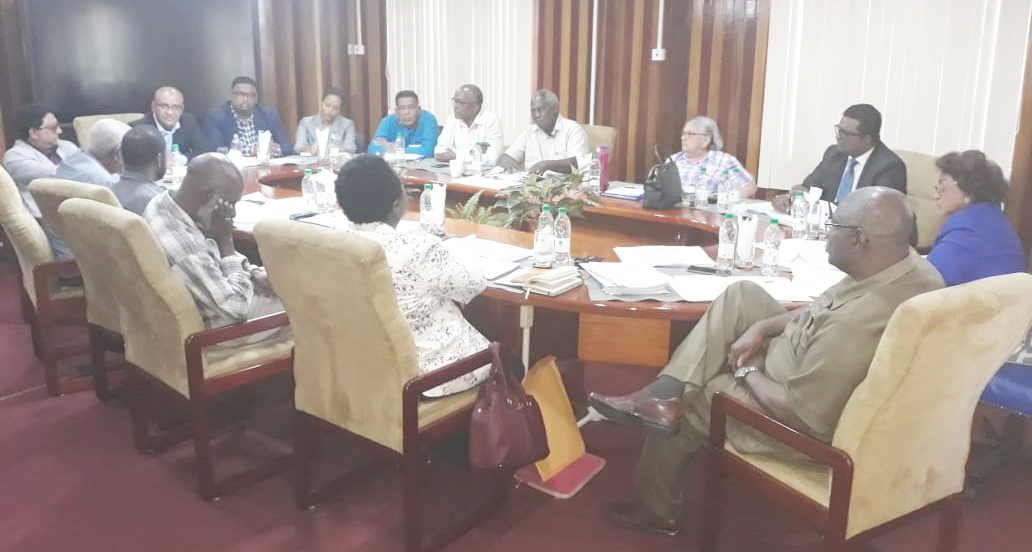Following mounting pressure and a meeting yesterday with the opposition People’s Progressive Party (PPP), the Guyana Elections Commission (GECOM) has agreed to increase the number of polling places in several areas for Monday’s general elections.
The request for additional polling places has been acquiesced to,” opposition-appointed Commissioner Sase Gunraj told reporters outside GECOM’s headquarters.
Gunraj explained that additional polling places will be established at Mon Repos though it has not been determined if these places will be private residences or, if necessary, tents.
The PPP has repeatedly argued that GECOM’s decision to place 18 polling stations in one polling place, the school compound, was likely to result in congestion and possible disenfranchisement of voters.
Describing such a possibility as a logistical nightmare, Gunraj maintained that though he agreed with the reduction and future elimination of private residences for polling places, logistics and efficiency and accessibility by voters cannot be sacrificed in that regard.
The new locations are to be identified by Chief Election Officer (CEO) Keith Lowenfield taking into consideration the logistics of the area and the distance a voter will have to travel to access those polling stations among other concerns.
Government-nominated commissioner Vincent Alexander confirmed that the CEO has been entrusted with the responsibility for addressing the appeals made by the opposition.
He also noted that there will be a review of the places said to be congested and alternative arrangements will be made including the possible use of tents.
Asked if the decision was unanimous or made via majority, Gunraj declined to offer a comment while Alexander said that the matter was not put to a vote but was decided via consensus.
Two hours earlier, Opposition Leader Bharrat Jagdeo who led the PPP/C team to the GECOM meeting, declared that the issue of more polling places was a red line matter for which the party was prepared to take to the streets in protest.
He repeatedly claimed that while the number of private residences had been reduced in PPP/C strongholds there remained a “large number of private polling places in APNU strongholds.”
He specifically accused Lowenfield of reducing the number of private residences in a discriminatory fashion.
“The CEO claimed that he had directions from the commission to reduce as many private polling places as possible so we asked how come you only reduced it in PPP strongholds,” Jagdeo said. He did not share the CEO’s response.
Jagdeo used as an example Golden Grove on the East Bank of Demerara which has 2000 voters registered to vote at six polling stations all of which are located at individual private residences.
Comparing that with Mon Repos which has 18 polling stations located at two public buildings, Jagdeo demanded that the commission increase the polling places by four or six.
“We said we not telling you where to choose but there has to be more polling stations,” he explained to media.
Asked if there were public buildings in Grove or Southern Georgetown, another APNU stronghold, which were not being used, Jagdeo refused to answer.
GECOM has repeatedly argued that private residences were being used only in places where public spaces were unavailable.
Other places where additional polling places were requested include Foulis, Chesney and Friendship/Kildonan.
In Foulis the CEO has previously acceded to a request to move tents which will house polling stations from the railway embankment but the party is also requesting four more polling places in the area so that residents do not have to travel over two miles to the Paradise Primary School to vote.
“People have a right to vote in their own communities,” Jagdeo stressed.
Announcement
Meanwhile the PPP/C has also questioned the announcement by GECOM Chair Claudette Singh that the decision to remove private residences as polling places was in keeping with a recommendation from the Carter Center following their observation of the 2015 General and Regional Elections (GRE).
According to Jagdeo the Center has told him that nowhere in their final report did they say that.
The Carter Center Report on the 2015 General and Regional Elections noted that because of the lack of state establishments in some areas, 166 (or 7%) of the 2,299 polling stations across the country were located in private buildings and residences.
It added that while the establishment of polling stations on private property did not seem to negatively influence public confidence in the electoral process, GECOM should take steps in future elections to ensure that citizens can cast their ballot in a neutral environment free from intimidation.
On Monday, the Private Sector Commission (PSC) expressed grave concern that a unilateral change in the location of polling places could disenfranchise voters and it called on GECOM to promptly reverse the last-minute alterations.
“The Private Sector Commission wishes to point out that, while GECOM is bound in law to observe the statutory process requiring the Chief Election Officer to act within the authority of the Commission, he appears to have acted unilaterally and on his own by changing the location of polling places between January and Feb-ruary and without informing the contesting political parties”, the PSC said.
The PSC said it was aware that the Chief Election Officer had presented to the Commission in January a document assigning polling places which was acceptable to the stakeholders.
“Given the factor of time involved, we urge that GECOM at the very minimum, promptly reverse the last minute and abrupt changes made in February to the assignment of polling places to those originally agreed upon in January”, the PSC urged.








